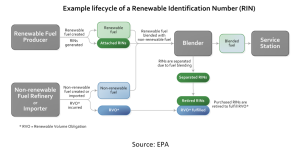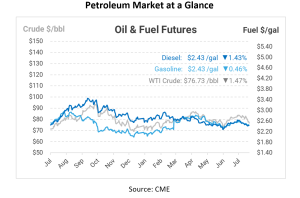
Why Compliance Matters in the Renewable Diesel Market
Renewable diesel (RD) is an increasingly preferred solution for reducing greenhouse gas emissions and promoting sustainable energy practices within the transportation industry. However, it is essential to ensure that the RD you purchase comes from suppliers in compliance with the Renewable Fuel Standard (RFS) set by the Environmental Protection Agency (EPA). Non-compliant suppliers may cut corners, leading to fuel that can be more expensive in the long run and less reliable in terms of supply.
In today’s article, we will discuss the pitfalls of non-compliance, particularly in relation to the management and retirement of Renewable Identification Numbers (RINs). Understanding these dynamics will help you make informed decisions to de-risk your renewable fuel usage.
What are RINs?
RINs are unique numeric codes assigned to batches of renewable fuel. They are integral to the Renewable Fuel Standard (RFS), a federal program administered by the EPA to reduce greenhouse gas emissions and expand the United States’ renewable fuel consumption in the transportation sector. Each RIN corresponds to a specific volume of renewable fuel and serves as a tracking mechanism to ensure compliance with the RFS mandate. You can read more about RINS here.

Why Retire RINs for Non-Transportation Use of Renewable Diesel?
When delivering renewable diesel for use in transportation applications, the associated RINs help obligated parties meet their Renewable Volume Obligations (RVO), supporting the overall goals of the RFS. However, when using renewable diesel for non-transportation purposes, such as for stationary equipment (generators, industrial machinery, etc.), the dynamics change.
The EPA mandates that RINs associated with renewable diesel must be retired if the fuel is used in non-transportation applications. This requirement is in place because the primary goal of the RFS is to reduce emissions in the transportation sector. Non-vehicular uses do not contribute to this goal, and therefore, the associated RINs cannot be counted towards an obligated party’s RVO.
What Makes a Supplier Non-Compliant When It Comes to RINs Retirement?
Several factors can lead to a supplier being non-compliant with RINs retirement requirements:
- Failure to Retire RINs – If a supplier does not retire RINs when using renewable diesel in non-transportation applications, they violate EPA regulations. This non-compliance can result in penalties and affect the supplier’s credibility.
- Improper RIN Management – Inaccurate tracking, reporting, or fraudulent generation of RINs can lead to non-compliance. Proper management is crucial to ensure that RINs accurately reflect the production and use of renewable fuel.
- Lack of Documentation – Suppliers must maintain accurate records of RIN transactions and retirement. Failure to provide necessary documentation during audits or inspections can result in non-compliance.
Impact on the Cost of Renewable Diesel
Retiring RINs impacts the economics of the fuel. Here’s why:
- Loss of RIN Value – After retiring RINs, they can no longer be used to meet RVOs. This loss in commodity trading value means that the financial incentive provided by the RIN market is unattainable and therefore becomes an opportunity cost.
- Higher Production Costs – Without financial support from RINs, Producers might need to raise the price of renewable diesel to cover the higher per-gallon production costs without the RIN subsidy.
- Market Dynamics – The renewable fuels industry is heavily supported by regulation. RIN values shift based on supply and demand dynamics, typically reducing consumers’ net cost of renewable fuels. Conversely, when RINs are retired, and their value is not realized, the cost burden shifts back to the consumer, resulting in renewable diesel being more expensive for stationary use applications.
Ensuring that your renewable diesel supplier complies with EPA regulations is essential for maintaining the integrity of your fuel supply. Compliant suppliers conduct proper due diligence and document thoroughly. They are informed and they manage RINs properly. By prioritizing compliance, you can support the integrity of the renewable fuel market while benefitting the environment and achieving your climate targets.
Maximize Your Journey Towards Sustainability
Understanding and implementing renewable diesel can seem daunting, but Mansfield’s team of sustainability experts makes the transition smooth. With comprehensive support, from quantifying the benefits for your specific fleet through total cost of ownership assessments to integrating renewable diesel into your fueling strategy, Mansfield ensures that every fleet can maximize the advantages of this innovative fuel.
As the demand for sustainable fuel solutions grows, renewable diesel stands out as an easy-to-implement choice that does not compromise performance. For fleet and equipment operators looking to make a change, the path forward with renewable diesel is clear and promising.
Mansfield Energy is at the forefront of this revolution, ready to help fleet and equipment operators understand and harness the benefits of switching to renewable diesel. Contact us today!

This article is part of Daily Market News & Insights
MARKET CONDITION REPORT - DISCLAIMER
The information contained herein is derived from sources believed to be reliable; however, this information is not guaranteed as to its accuracy or completeness. Furthermore, no responsibility is assumed for use of this material and no express or implied warranties or guarantees are made. This material and any view or comment expressed herein are provided for informational purposes only and should not be construed in any way as an inducement or recommendation to buy or sell products, commodity futures or options contracts.





